Musician Spotlight: Principal Cellist, Alex Mansour
- Posted by - American Youth Symphony
- on -
- 0 Comment
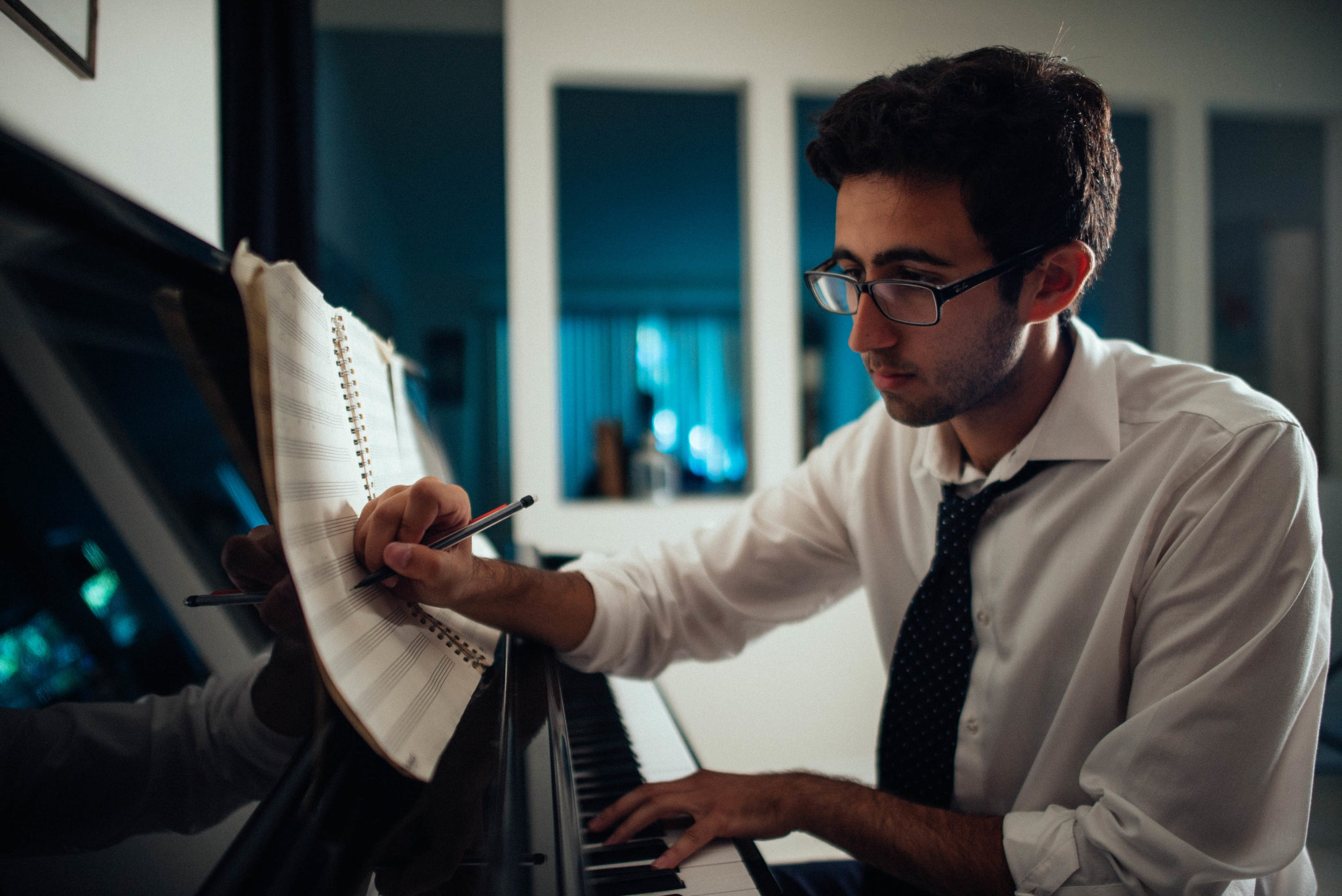
Alex Mansour is AYS’ Principal Cellist and a current Graduate Student at USC Thornton School of Music working towards his Masters in Composition. Originally from Santa Clarita, California, Alex grew up playing multiple instruments and taking private lessons in the Los Angeles area at Colburn Conservatory and Pasadena Conservatory of Music. Since becoming an accomplished cellist and pianist, Alex has turned to following his dreams of becoming a composer. In February 2020, his piece Fantasy Noir had its WORLD PREMIERE with the USC Thornton Symphony! We sat down with Alex to learn more about his artistic journey and path of being a composer.
How many instruments do you play and when did you start playing?
I was fortunate to grow up with a family that particularly values music. The piano in our house quickly became my playground for many years. I started playing piano at 3 and cello at 6. I also studied classical guitar for a few years during high school.
What do you enjoy most about the cello?
One of my favorite feelings in the world is to sit behind the cello and play open strings. The instrument is so resonant, so warm, that the experience becomes quite meditative. When too much time passes without playing the instrument, I feel this yearning to return to it. I imagine that it will always play a very special role in my life.
What is your most memorable moment while being Principal Cellist for AYS this season?
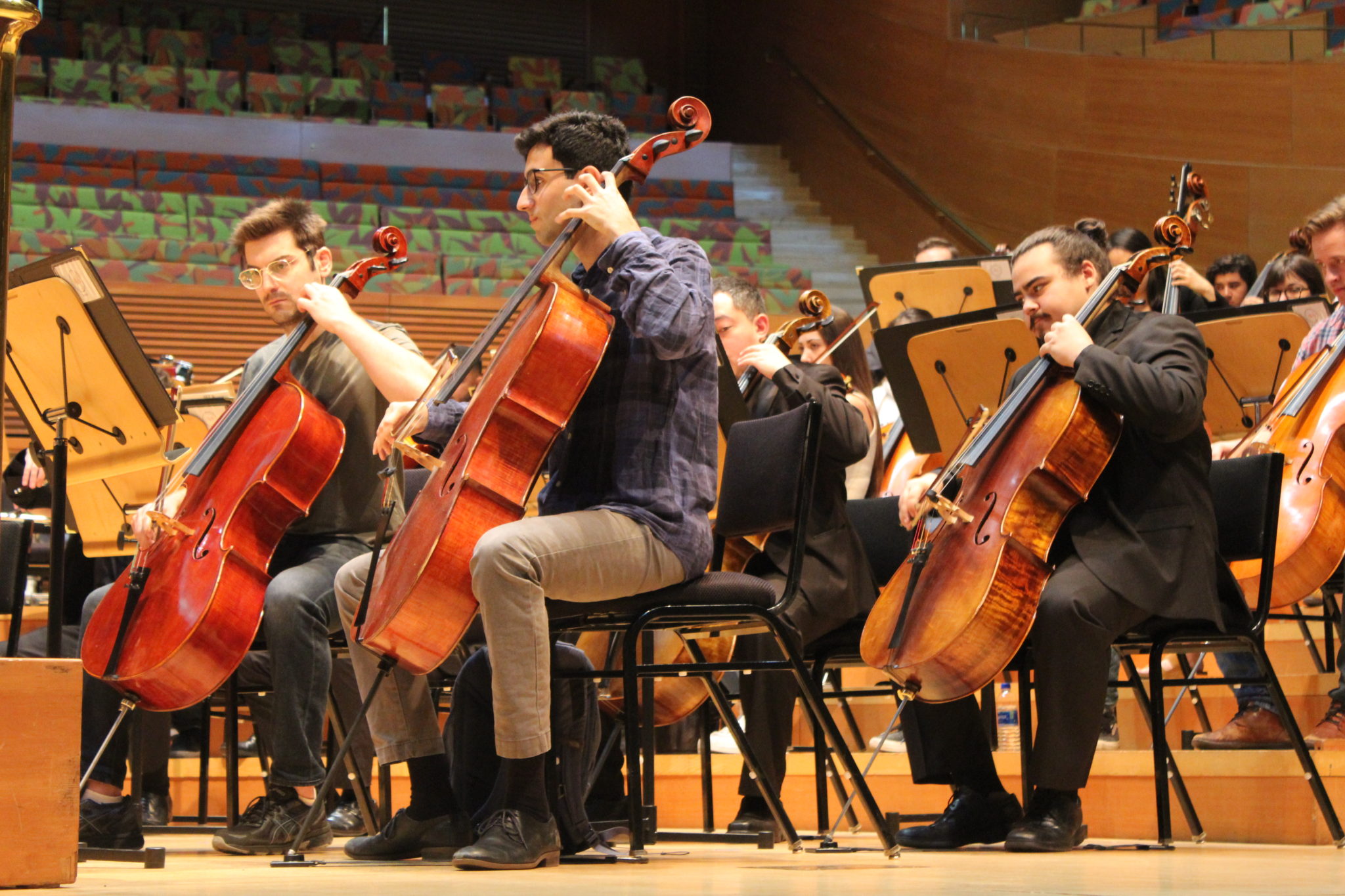
I feel so grateful to have joined AYS, and it quickly became a great way of continuing my orchestral playing this year. To study the repertoire from within the section is a fascinating process of discovery; I really appreciate Maestro Izcaray’s programming of new music alongside the tried and true master works. My favorite memory this season was likely the performance of Saint-Saens’ Organ Symphony at Disney Hall. The slow movement (the lyrical Db Major moment) is perhaps one of the most magical, sublime compositions ever captured, and hearing it in that space was almost spiritual. And of course, the finale with the organ at its’ full capacity is another moment of awe. I remember playing and feeling so incredibly lucky, marveling at the combination of circumstances that culminated in having the privilege to play that music in such a magnificent space.
Tell me about your studies at USC Thornton School of Music.
This has been my first year (of a two year program) at USC, pursuing a M.M. in Composition. I study with composer and chair of the department Donald Crockett, who is also a gifted conductor. I had majored in cello performance during my undergrad and wanted to continue seriously studying composition in a graduate degree.
The school has a fantastic program for my interests, especially in its diversity of musical experience. I play piano with USC’s Honors Combo, which has been invaluable in teaching me so much more about combo improvisation (both in modern jazz and traditional swing/bebop). I participate as a cellist with the new music ensemble (led by Donald Crockett, almost exclusively programming music from living composers). I also score a handful of films (both for USC students and independent filmmakers) each semester, which is terrific practice in working with storytellers. Currently, I’m scoring a documentary for filmmaker Patrick Creadon about college basketball and race relations in the early 60s. We’ve found an engaging sound in taking the cinematic “sports-film” musical aesthetic and adding inflections of Chicago blues and big band jazz idiom. I thoroughly enjoy the process of helping someone find a musical language that fits their project, and the collaborative nature of supporting a film.
I heard your new piece, Fantasy Noir recently premiered with the USC Thornton Symphony. Tell us about your piece and your process of composing it.
USC presents an annual “New Music for Orchestra” concert, where the symphony dedicates a cycle to rehearsing and performing recently written works from the composers in residence. The composers submit orchestral works for consideration, and the faculty programs an engaging concert that features several different voices from across the department. It was an honor to hear my piece alongside such talented colleagues.
I had started Fantasy Noir last summer with the intention of submitting to this call for scores. I set out to write a showpiece, an orchestral overture of sorts that could really challenge the virtuosity of the ensemble and begin a concert with a bang. Phillip Glass had done a residency at the University of Notre Dame when I first had the idea. He called into question the common practice of changing the music under a consistent piece of film (trying a variety of different cues for example to see what works), but rarely if ever could multiple films be created and set to a piece of music. This inspired me to write a piece that could never function as purely a film score (this music being far too self indulgent and unapologetically expressive), yet a piece that is undeniably narrative, dramatic, and genuinely affectionate in its treatment of classic Hollywood sensibility. And considering an ever expanding interest in orchestral rep including live-to-screen score performances, I thought this piece might find a home.
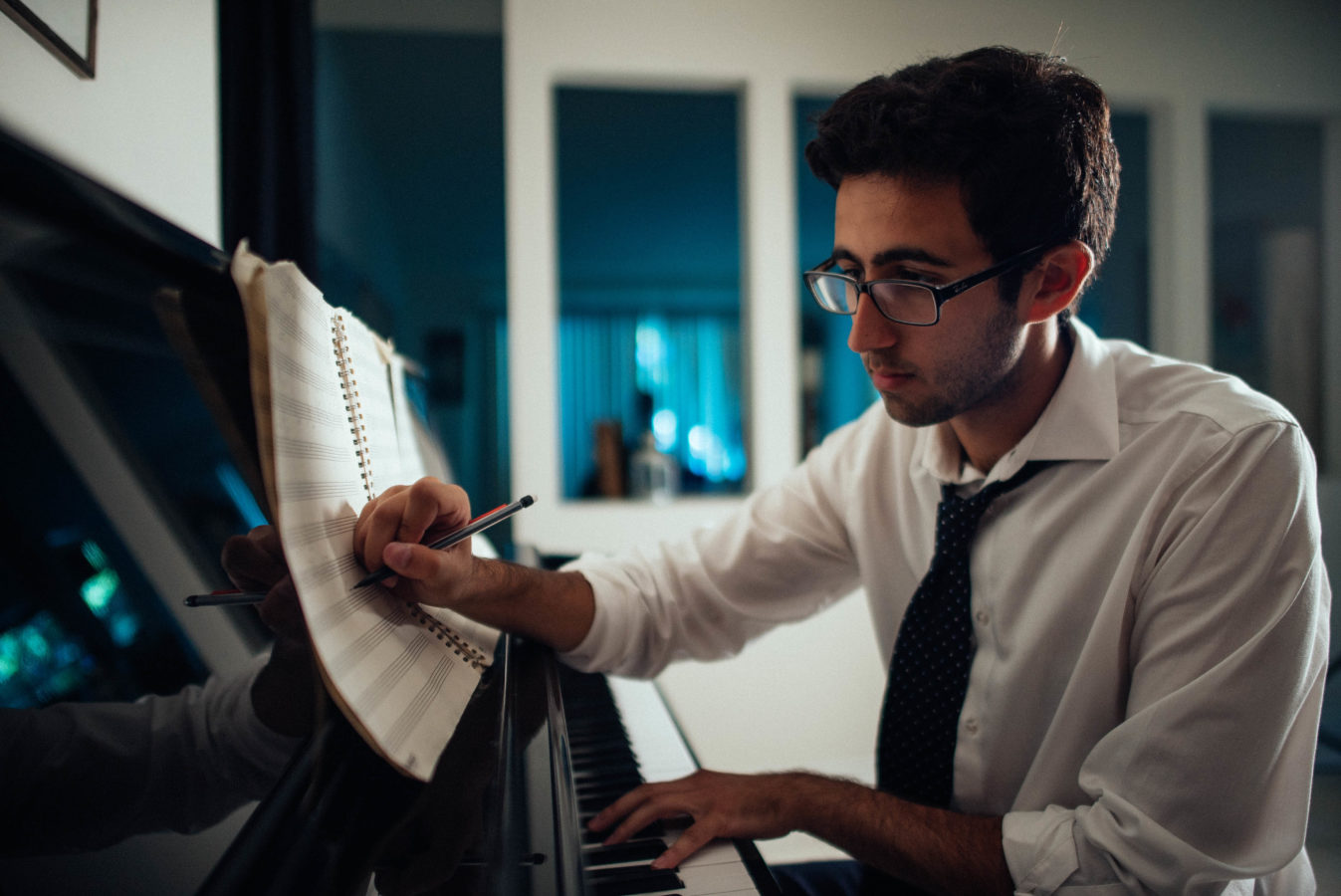
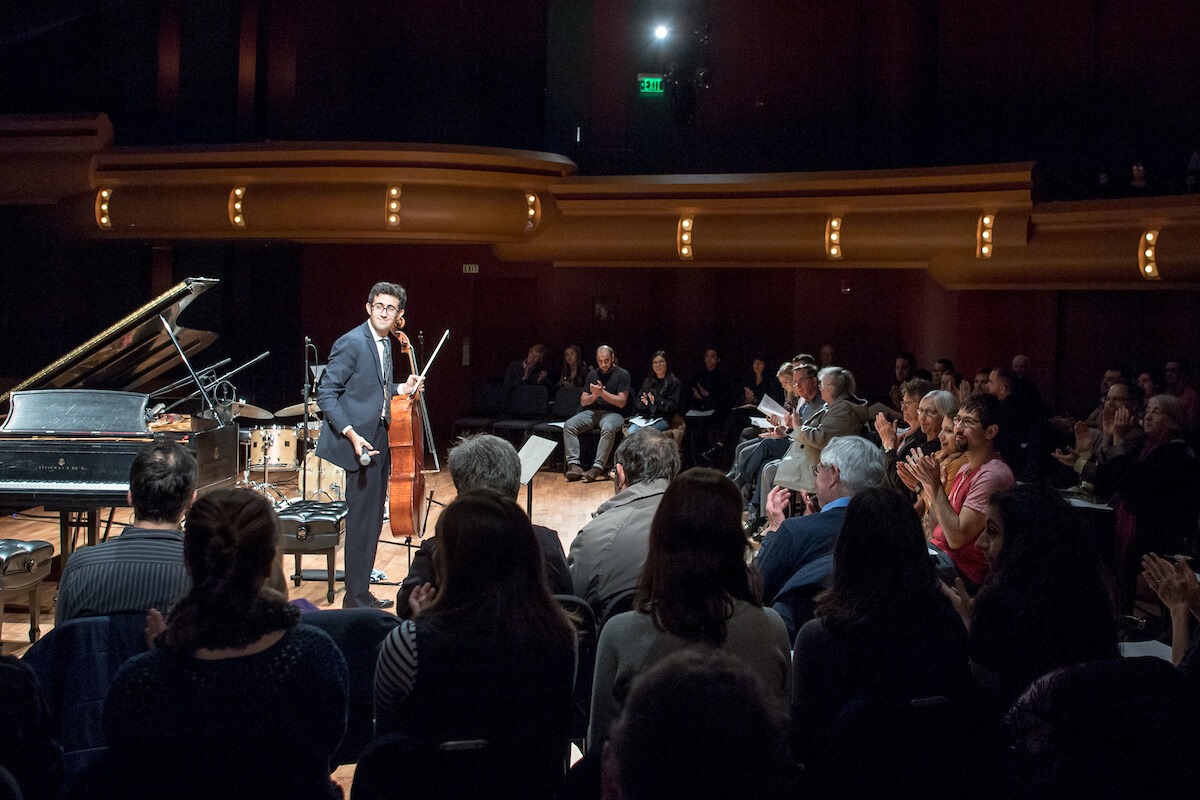
There were four rehearsals total for a 12 minute performance. It is such an enormous privilege to have original music performed by an orchestra, not to mention an invaluable learning experience in orchestration. The piece was a joy to compose, tipping my hat to the scores I loved growing up, and to hear it played so well, an absolute honor. If you want to listen to it, click here.
How did your interest in film music develop?
Ever since I can remember I wanted to write music for movies. Growing up, the music of John Williams and Jerry Goldsmith filled our home. I think ever since I was very young I had a great love for melody and lyricism. I loved sonorous tonal harmonies and dramatic gestures. Film music struck me as exactly that, and as I grew and explored the music of Korngold, Herrmann and Morricone, I discovered the many other musical colors that also occupy film scores.
As I get older and work in both disciplines (film/concert music), I only become more inspired, despite recognizing some serious differences in approach. Studying concert music has provided great training and strikes me as necessary…after all, great cinematic scores owe a lot to the music of great romantics like Tchaikovsky, Wagner, Dvorak, etc. Even contemporary composers like Johnny Greenwood (Phantom Thread, Radiohead) find inspiration in concert works (Penderecki for example). I think that in the coming years, we will begin to see genres continue to blur even more. Filmmakers are hungry for different musical colors, as are composers, and the opportunity to marry tradition with the new/avant-garde is ripe.
That being said, I also am working to hone craft in the different skill sets both types of composing requires. Concert composing (at times) can become an overwhelming responsibility, sometimes crushing in the sense that an entire piece depends solely on your choices. Conversely, film composing is inherently a collaborative medium, testing your ability to articulate the director’s vision sonically. It is a balance of your own ideas and honoring the material of the film.
What is your dream as an artist?
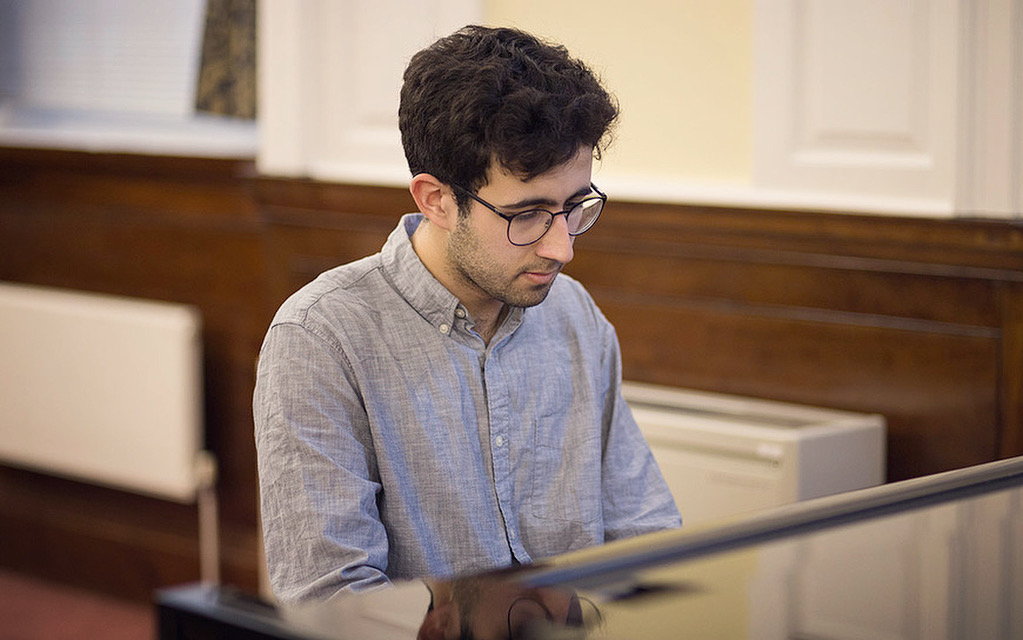
The 21st century strikes me as a wonderful time to be a composer/performer. I always felt growing up the need to specialize, to call myself this or that. I dream to be an artist who is a player as much as a composer. I hope to also see less differentiation between a “concert composer” and a “film composer”, and to be an example to young musicians of the vast array of creative opportunities. Everything I have studied, from Oscar Peterson to Hans Abrahamsen to Camille Saint-Saens, has made me a richer musician. As a composer, I write best when I have practiced and am agile on my instrument, and writer’s block is hard to come by when constantly absorbing repertoire of diverse mediums.
I am currently in the midst of finishing my first cello concerto (this time of quarantine has ushered in a sudden productivity). It is my degree thesis of sorts, a piece that celebrates many different terrains in the new music spectrum. Never before have composers had more agency and liberty to create such contrast in their music. I find it so exciting – everything is fair game! I dream of continuing the lineage of neo-romantic composers combined with contemporary techniques, writing music that engages with stylistic pluralism but remaining always honest and expressive.
Are there any musicians or composers who have inspired you?
There are so many, but to think of a few, I’d look to André Previn and Leonard Bernstein. To see such giants lead multi-faceted musical careers (conducting, composing, performing) at such a high level has been transformative in how I conceptualize a career in music. And of course some of the few I’ve mentioned already…Korngold, Philip Glass, John Williams, Samuel Barber, Hildur Guðnadóttir, Brad Mehldau, Missy Mazzoli, Tchaikovsky, Piazzolla…the list could go on and on.
Do you have any advice for young aspiring composers?
I don’t know that I’m in any position to give advice, but to share some thoughts that have been very meaningful to my own development, I’d encourage a young composer to write constantly and fearlessly in search of their own voice. There are so many talented composers who write all sorts of music, but your voice is objectively unique and necessary. Composing should be about the pursuit of writing music that is genuine, honestly expressive, and learning to refine the craft to the utmost of your ability.
Something that I find very encouraging is that I have yet to identify music that already exists that would perfectly encompass what or how I want to write. I love many different musics, but I have not found a piece yet where I think “that’s exactly what I’m looking for”. To me, this is the largest indication that I have something to offer.
Perhaps to conclude, there is one quote in my sketchbook (from author Annie Dillard) that I am quite fond of:
“One of the things I know about writing is this: spend it all, shoot it all, play it, lose it, all, right away, every time. Do not hoard what seems good for a later place or another place. Give it, give it all, give it now. The impulse to save something good for a better place later is a signal to spend it now. Something more will arise for later, something better. These things fill from behind, from beneath, like water…anything you do not give freely and abundantly becomes lost to you”
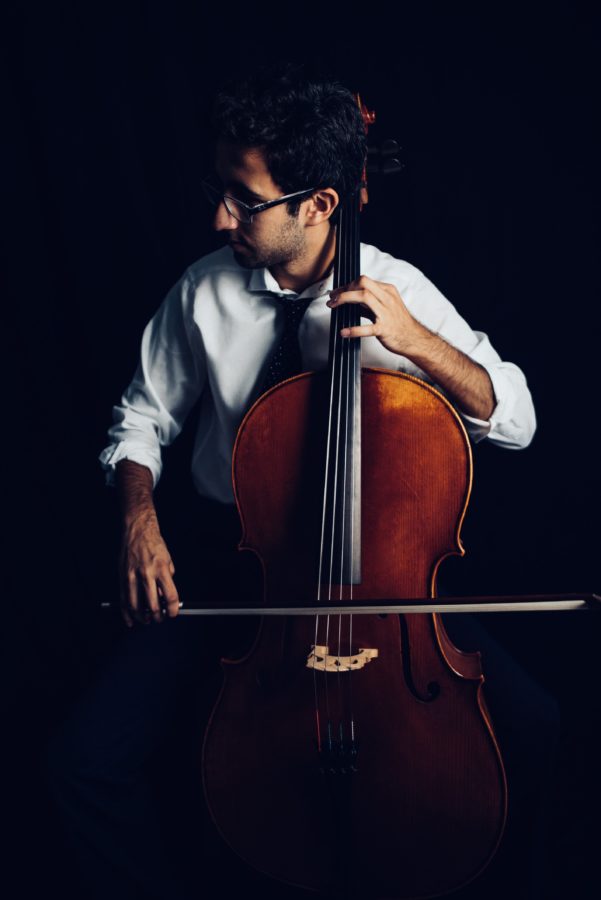
About Alex Mansour
Alexander Mansour is a composer, pianist, and cellist from Los Angeles California. His music is fascinated with the lyricism of romantic expression, dramatic juxtaposition of disparate harmonies, and dynamic narrative structures.
As a pianist, Alex arranged and played for Arturo Sandoval’s Christmas album, performing with him at Walt Disney Concert Hall in 2018. He attended the 2019 BANFF International Workshop for Jazz and Creative Music, a program helmed by Vijay Iyer and Tyshawn Sorey and is the pianist of the USC Jazz Honors Combo.. As a cellist, Alex serves as principal of American Youth Symphony, and has joined the New York String Orchestra Seminar for their Christmas concerts at Carnegie Hall. He has also appeared on NPR’s “From the Top”. He has studied with Katinka Kleijn (CSO) and during an exchange in London, Richard Lester (Royal College of Music).
As a composer, Alex is passionate about writing for both the concert hall and the screen. His chamber music has been performed at the Bowdoin and Atlantic Music Festivals. He will study and premier a new commission at the Yale School of Music this summer (2020) for the Norfolk New Music Festival. A recent orchestral work (Fantasy Noir) was premiered by USC’s Thornton Symphony in February 2020, and a prior orchestral work (Across the Sea) was commissioned and performed by the Notre Dame Symphony Orchestra in 2018. His music for media has been featured on NBC Broadcasts and Netflix original content. Most recently, he scored an AFI Feature Documentary selection, “Hesburgh”, which just finished its theatrical distribution, and he is currently collaborating with dir. Patrick Creadon once again on a second documentary. Over the years, he has been recognized twice an ASCAP Finalist in the Morton Gould Young Composer Competition and the Herb Alpert Young Jazz Composer Awards. Alex is very grateful to join the USC Thornton School of Music where he studies with Professor Donald Crockett in pursuit of the Masters in Music degree. He previously studied with John Liberatore at the University of Notre Dame, where he double majored in cello performance and film studies.
Alex would like to thank his teachers and especially his family for their love and support. He is very proud to be able to share his music with others, and is very appreciative of everyone who has helped him learn and progress through his studies.
Visit his website to learn more about his past projects, https://www.alexmansourmusic.com/

